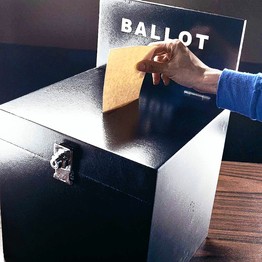The Case for Voter ID
You can't cash a check, board a
plane, or even buy full-strength Sudafed
over the counter without ID. Why should
voting be different?
By KRIS W. KOBACH
WSJ.com
On Thursday, the Wisconsin legislature sent a bill requiring photographic identification for voting to Gov. Scott Walker's desk. This follows the enactment of an even stricter law in Kansas a few weeks ago.
Drafted by my office, Kansas's Secure and Fair Elections Act combined three elements: (1) a requirement that voters present photo IDs when they vote in person; (2) a requirement that absentee voters present a full driver's license number and have their signatures verified; and (3) a proof of citizenship requirement for all newly registered voters. Although a few states, including Georgia, Indiana and Arizona, have enacted one or two of these reforms, Kansas is the only state to enact all three.
Other states are moving in the same direction. The Texas legislature sent a photo-ID bill to Gov. Rick Perry's desk last Monday. And next year Missouri voters will get a chance to vote on a photo-ID requirement.
Immediately after the Kansas law was signed in April, critics cried foul. They argued that voter fraud isn't significant enough to warrant such steps, that large numbers of Americans don't possess photo IDs, and that such laws will depress turnout among the poor and among minorities. They are wrong on all three counts.
Voter fraud is a well-documented reality in American elections. To offer a few examples, a 2010 state representative race in Kansas City, Mo. was stolen when one candidate, J.J. Rizzo, allegedly received more than 50 votes illegally cast by citizens of Somalia. The Somalis, who didn't speak English, were coached to vote for Mr. Rizzo by an interpreter at the polling place. The margin of victory? One vote.
In Kansas, 221 incidents of voter fraud were reported between 1997 and 2010. The crimes included absentee-ballot fraud, impersonation of another voter, and a host of other violations. Because voter fraud is extremely difficult to detect and is usually not reported, the cases that we know about likely represent a small fraction of the total.
My office already has found 67 aliens illegally registered to vote in Kansas, but when the total number is calculated, it will likely be in the hundreds. In Colorado, the Secretary of State's office recently identified 11,805 aliens illegally registered to vote in the state, of whom 4,947 cast a ballot in the 2010 elections.
Evidence of voter fraud is present in all 50
states, and public confidence in the
integrity of elections is at an all-time
low. In the Cooperative Congressional
Election Study of 2008, 62% of American
voters thought that voter fraud was very
common or somewhat common.
Fear that elections are being stolen erodes the legitimacy of our government. That's why the vast majority of Americans support laws like Kansas's Secure and Fair Elections Act. A 2010 Rasmussen poll showed that 82% of Americans support photo ID laws. Similarly, a 2011 Survey USA poll of Kansas voters showed that 83% support proof-of-citizenship requirements for voter registration.
Critics of these laws nevertheless make outrageous arguments against them. New York University's Brennan Center, which stridently opposes all photo ID laws, claims that a whopping 11% of the American voting-age public—that means tens of millions of people—don't possess a photo ID. It bases this number on a survey it conducted in 2006.
However, we don't have to rely on implausible estimates when the actual numbers are readily available. In Kansas, my office obtained the statistics, and they tell a very different story. According to the 2010 census, there are 2,126,179 Kansans of voting age. According to the Kansas Department of Motor Vehicles, 2,156,446 Kansans already have a driver's license or a non-driver ID. In other words, there are more photo IDs in circulation than there are eligible voters. The notion that there are hundreds of thousands of voters in Kansas (or any other state) without photo IDs is a myth.
Carrying a photo ID has become a part of American life. You can't cash a check, board a plane, or even buy full-strength Sudafed over the counter without one. That's why it's not unreasonable to require one in order to protect our most important privilege of citizenship. But just in case any person lacks a photo ID, Kansas's law provides a free state ID to anyone who needs one. Other states have included similar provisions in their photo-ID laws.
Some opponents of election security laws also declare that they are part of a sinister plot to depress voter registration and turnout, especially among minority voters who are more likely to vote Democrat. Here too the facts do not support the claim. Georgia's photo ID requirement was in place for both the 2008 and 2010 elections, when turnout among minority voters was higher than average. Likewise, Arizona's proof-of-citizenship requirement for registration has not impeded minority voters from registering.
If election security laws really were part of a Republican scheme to suppress Democratic votes, one would expect Democrats to fight such laws, tooth and nail. That didn't happen in Kansas, where two-thirds of the Democrats in the House and three-fourths of the Democrats in the Senate voted in favor of the Secure and Fair Elections Act. They did so because they realize that fair elections protect every voter and every party equally.
No candidate, Republican or Democrat, wants to emerge from an election with voters suspecting that he didn't really win. Election security measures like the one in my state give confidence to voters and candidates alike that the system is fair.
Mr. Kobach is the Kansas secretary of state. He is also the co-author of Arizona's SB 1070 illegal immigration law and former Counsel to U.S. Attorney General John Ashcroft.


